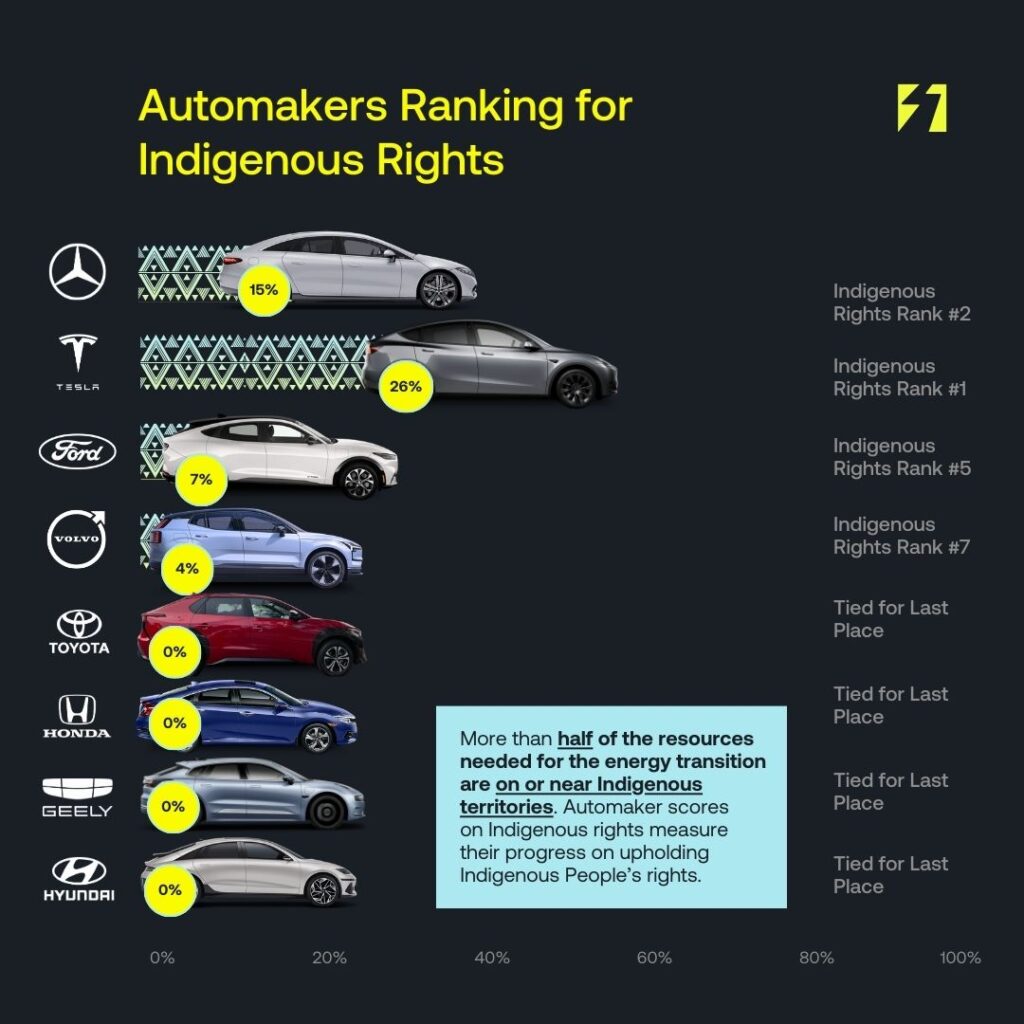 When we released our 2024 leaderboard ranking automakers on their efforts to ensure equitable, sustainable supply chains, we were heartened by a lot of the progress we saw. But in one very important area, automakers have made very little progress: respecting Indigenous rights.
When we released our 2024 leaderboard ranking automakers on their efforts to ensure equitable, sustainable supply chains, we were heartened by a lot of the progress we saw. But in one very important area, automakers have made very little progress: respecting Indigenous rights.
More than half of the resources needed to power the energy transition are located on or near Indigenous Peoples’ lands. But far too often, projects linked to auto supply chains, and extraction projects specifically, are conducted on Indigenous Peoples’ territories without their consent, sometimes even displacing them from their ancestral lands. Extractive projects also pollute natural resources, which affects these communities’ right to food, water, livelihoods, and culture. As the transition to electric vehicles accelerates, it is critical that activities across the auto supply chain respect Indigenous Peoples’ right to self-determination and to Free, Prior and Informed Consent (FPIC).
According to our leaderboard, in 2023 over 70% of automakers made no progress on Indigenous Peoples’ rights. Only three companies (Tesla, Volvo and Volkswagen) increased their scores and 61% of automakers continued to score 0% on this issue. Only 31% of automakers score zero on the steel indicators, demonstrating a failure among automakers to prioritize Indigenous rights among supply chain issues.
“It is imperative to recognize that any missteps in this transition could potentially inflict harm upon Indigenous Peoples, affecting their livelihoods, cultural connections to ancestral lands, and the biodiversity they have responsibly stewarded for centuries,” said Galina Angarova, Executive Director of Securing Indigenous Peoples’ Rights in the Green Economy (SIRGE) Coalition upon launch of the leaderboard. “Recognition, respect, and upholding of Indigenous Peoples’ right to self-determination, operationalized through the full implementation of Free, Prior and Informed Consent (FPIC), stands as the cornerstone for a truly just and equitable energy transition benefiting all.”
Essential actors like the US government also fail to meet the standard of FPIC, with recent DoD grants being awarded to mining projects opposed by Indigenous groups. GM also recently announced a $650 million investment in the Thacker Pass lithium mining project, opposed by the Reno Sparks Indian Colony, Berns Paiute Tribe, Summit Lake Paiute Tribe, and People of Red Mountain.
Angarova described this dynamic in a recent blog post, writing: “As the world undergoes the energy and digital transition, the demand for electric vehicles and minerals such as lithium, cobalt, copper, and nickel will continue to grow as well. Companies rushing to secure their supply of these minerals are causing an increase in pressure on Indigenous Peoples’ lands, conflicts, and numbers of Indigenous Peoples affected by mining. These effects include pollution, man camps, loss of biodiversity, disease, displacement, loss of culture, and growing numbers of Missing and Murdered Indigenous Women. While mining efforts are viewed as vital to a transition to a so-called green economy, the harmful effects and lack of consent by Indigenous Peoples do not create a just transition.”
The only hopeful sign for Indigenous Peoples’ rights in the leaderboard was Tesla’s improved score, which rose from 5% to 26%, enabling the company to take the top spot for this subsection from Mercedes. The company has introduced an updated requirement on FPIC, stating that: “For all raw material extraction and processing used in Tesla’s products, we expect our suppliers to engage with legitimate representatives of Indigenous communities and respect their right to grant or withhold free, prior, and informed consent for their operations.”
Indigenous-led organizations aren’t waiting for automakers to act – they’re actively advocating for policymakers and industry actors to commit to respecting FPIC. Just this month representatives from Indigenous rights advocacy groups including members of the SIRGE coalition – which is itself a member of the Lead the Charge network – met in New York ahead of the UN Permanent Forum on Indigenous Issues. Organizations including Indigenous Peoples Rights International, Right Energy Partnership with Indigenous Peoples, and Business and Human Rights Resource Center released a Declaration on issues surrounding the transition to renewable energy and impacts on Indigenous Peoples’ communities. They wrote:
“We are experiencing an increasing trend of criminalization and attacks against Indigenous Peoples Human Rights Defenders (IPHRDs), who speak out against the impositions of mining and energy projects that violate our rights. This is happening on both ends of the renewable energy value chain, including the mining of transition minerals and renewable energy projects. The lack of legal recognition and respect of Indigenous Peoples’ rights, including the requirement to respect our Free, Prior and Informed Consent (FPIC), exacerbates land and resource dispossession, displacement, destruction of our livelihoods, disintegration of our communities, and disempowerment of Indigenous women and youth in the energy transition.”
The Indigenous Peoples Global Coordinating Committee with members representing all seven socio-cultural regions of the world, in partnership with and support from the SIRGE Coalition, are also planning for an Indigenous-led Summit – JUST TRANSITION: Indigenous Peoples’ Perspectives, Knowledge and Lived Experiences this October in Geneva, Switzerland. The summit will examine the impacts of the energy transition on Indigenous Peoples and will challenge mainstream interpretations and implementations of how a just transition to a “Green Economy” is being defined, centering Indigenous Peoples’ priorities and solutions.
Automakers have a long way to go on respecting Indigenous rights. Automakers like Tesla and Mercedes have begun to make moves toward requiring FPIC, but no company we studied scored any points on the remedy indicator, which requires companies to demonstrate they have a process for investigating and remedying breaches of FPIC in their supply chain.